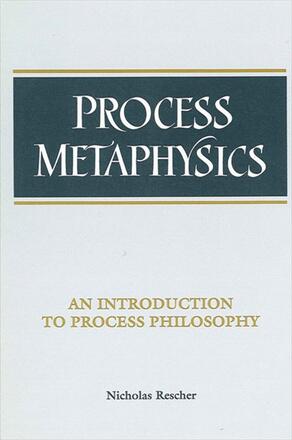
Process Metaphysics
An Introduction to Process Philosophy
Alternative formats available from:
Presents a synoptic, compact, and accessible exposition of this influential and interesting sector of twentieth-century American philosophy.
Description
This is a synoptic, compact, and accessible exposition for readers who want to inform themselves regarding this influential and interesting sector of twentieth-century American philosophy.
Nicholas Rescher is University Professor of Philosophy at the University of Pittsburgh, where he also served as Chairman of the Department of Philosophy and as Director of the Center for Philosophy of Science. For over three decades, he has been editor of the American Philosophical Quarterly. He was elected to membership in both the Institut International de Philosophie and the Academie Internationale de Philosophie des Sciences. Rescher is the author of more than 60 books in various areas of philosophy, and his works have been translated into German, Spanish, French, Italian, and Japanese. He has held fellowships from the J. S. Guggenheim Foundation, the Ford Foundation, and the American Philosophical Society. He is a former president of the American Philosophical Association, the C. S. Peirce Society, and the G. W. Leibniz Society of America and has served as a member of the Board of Directors of the International Federation of Philosophical Societies. He was elected an honorary member of Corpus Christi College, Oxford and in 1983 he received an Alexander von Humboldt Humanities Prize, awarded under the auspices of the Federal Republic of Germany, "in recognition of the research accomplishments of humanistic scholars of international distinction. "
Reviews
"In this book, one of the nation's most literate, prolific, and respected philosophers brings his considerable analytic skills to bear on process philosophy. It is over 30 years since a philosopher of such national and international stature has chosen to focus on the main issues of this extensive but neglected philosophical school. Earlier evaluations of process philosophy by Strawson, Rorty, and Grünbaum, moreover, were partial, selective, and often rested upon serious misunderstandings. By contrast, Rescher aims at a comprehensive, fair, and impartial treatment of the main problems in analytic metaphysics, including now-standard problems in logic, language, and epistemology, to which a process-oriented approach offers substantive insights. Rescher offers a calm, thoughtful, and open-minded analysis of problems such as personhood and personal identity, the status of universals and particulars, our understanding of nature and of biological and cultural evolution, and brief discussions of philosophical approaches to the nature of scientific inquiry itself and to theology that coordinate the insights of process philosophy and with the work of many leading contemporary anglo-American philosophers.
"This is a masterly treatment and a monumental achievement, resulting in an eminently readable introduction and survey for specialists and a useful and instructive outline for students. " — George R. Lucas, Jr. , Georgetown University